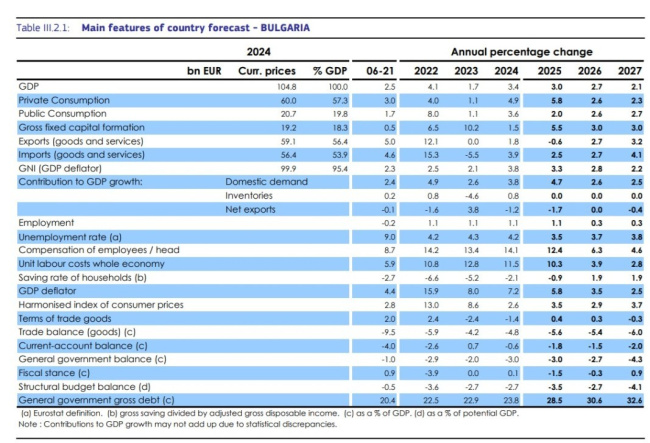The European Commission has revised its outlook for the Bulgarian economy, projecting a slowdown in growth over the next few years. According to the Commission’s annual autumn economic forecast, Bulgaria’s GDP is expected to expand by 2.7% in 2026 and further slow to just 2.1% in 2027, down from an estimated 3.0% in 2025. The main driver of this slowdown is weakening domestic demand, with declines anticipated in both consumption and investment.
After a strong 3.4% growth in 2024, driven by public and private spending, Bulgaria’s economic momentum is set to ease. Investment, which accelerated in early 2025 thanks to increased absorption of Recovery and Resilience Plan funds, began tapering off in the latter half of the year due to lower-than-expected budget revenues and constrained state support. Private consumption is also expected to moderate, reflecting slower wage growth and more restrained social transfers in 2026 and 2027.
Exports faced disruptions in early 2025 due to repair work by two key exporters, though a rebound is anticipated later in the year. Imports, on the other hand, continue to grow, fueled by domestic demand and planned purchases of military equipment. Wage growth in 2024 and early 2025 was substantial, particularly in sectors such as security, defense, and education, which helped offset inflationary pressures from prior years. However, the pace of wage increases is expected to ease, and unemployment, while declining toward 4% in 2025, remains an area to monitor, even with support from labor imports.
Inflation is set at a relatively high 3.5% in 2025, driven by VAT hikes on bread and restaurant services, excise duty increases, and regulated energy prices. The Commission expects inflation to fall to 2.9% in 2026 before climbing again to 3.7% in 2027, largely due to higher energy costs associated with the European Union’s ETS-2 emissions trading scheme, unless its implementation is postponed.
Fiscal pressures are intensifying. The budget deficit, estimated at 3% of GDP in 2025, is projected to narrow to 2.7% in 2026 before widening sharply to 4.3% in 2027, largely due to increased defense spending and deliveries of military equipment. Meanwhile, the government debt-to-GDP ratio is expected to rise from 23.8% in 2024 to 32.6% in 2027, driven by refinancing of old liabilities and capital injections into state-owned entities such as the Bulgarian Energy Holding and the Bulgarian Development Bank. These developments, combined with ongoing public wage and pension increases not fully offset by revenue growth, pose serious risks to Bulgaria’s fiscal stability.
The broader European context adds to the concern. The European Commission has revised down its forecast for eurozone growth to 1.2% in 2026, with the EU as a whole expected to grow by 1.4%, slightly below previous estimates. Trade tensions and geopolitical uncertainties continue to weigh heavily on the bloc’s “highly open” economy. Inflation in the eurozone is projected at 1.9% in 2026, up from 1.7%, with energy price rises partly offsetting slower growth in food and services costs.
While the EU economy remains resilient, with declining unemployment and modest real income growth supported by wage gains above inflation, the fiscal picture is gradually worsening. The EU budget deficit is expected to increase to 3.4% by 2027, largely driven by defense expenditures, and government debt will rise toward 85% of GDP, with the euro area reaching 90.4% and four member states crossing the 100% threshold.
In Bulgaria, the combination of slowing domestic activity, rising deficits, and increasing debt highlights the country’s growing vulnerability. The projected slowdown in growth, coupled with persistent inflation and mounting public spending, underscores the need for urgent fiscal and structural measures to maintain economic stability. Without careful management, the country faces a precarious financial path toward 2027, raising concerns about the sustainability of public finances and the broader resilience of the Bulgarian economy.
EC Autumn Macroeconomic Forecast for Bulgaria
